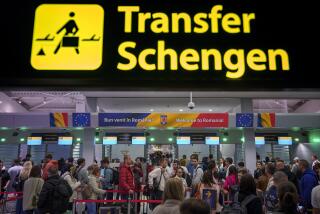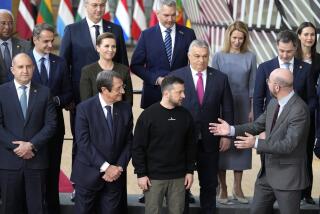The Week Ahead: EU inducts Croatia, U.S. sanctions hit Iran
Europe’s unhappy family expands with Croatia
Monday, July 1 -- Croatia, spun free 20 years ago after a brutal war with Serbs and Muslims over the remnants of a disintegrating Yugoslav federation, becomes the 28th member of the European Union on Monday.
The nation of 4.5 million people with hundreds of miles of stunning Adriatic Sea coastline and islands joins a club that has lost much of its luster in recent years as its members struggle through recession, debt, record unemployment and flagging confidence in the euro common currency used by 17 EU states.
Croatia joins the alliance in as bad, if not worse, economic condition. The EU’s statistical office, Eurostat, calculated Croatian joblessness at 18.1% in June and -- as in Greece and Spain -- more than half of workers under age 25 have failed to find employment. The EU jobless rate has notched record highs month after month for nearly a year, reaching 12.2% in the latest Eurostat survey.
Croatian and EU officials have cautioned the new entrant that membership isn’t likely to make any appreciable difference in living conditions or economic health in the short term. But rewards will be felt, Croatian President Ivo Josipovic recently assured an increasingly skeptical public, once Croatia’s production and trade are realigned to take advantage of duty-free access to other EU member markets.
EU rules will require Croatia to continue fighting the corruption once rife in the early days of independence. Transparency International now ranks Croatia 62nd in its graft index for 175 countries, below the likes of Cuba, Namibia and Georgia in clean governance.
When Croatia began negotiating its entry into the EU eight years ago, polls showed 85% support for membership in the bloc. More recent opinion surveys show popular enthusiasm to join has dropped to about 60%, and less than half expect tangible benefits from inclusion.
The EU’s expansion to include Croatia -- its 11th member from the former communist orbit -- may be the last for several years, as other applicants such as Serbia and Albania have been unable to meet alliance economic and democracy-building benchmarks for membership.
And Turkey, which has been negotiating for years to join, was told by EU officials June 25 that resumption of membership talks will be delayed at least four months in light of Prime Minister Recep Tayyip Erdogan’s crackdown on peaceful protests against his government. Ukraine’s bid for EU entry is also on hold pending resolution of territorial and other disputes with Russia and the imprisonment of former Prime Minister Yulia Tymoshenko.
Sanctions’ squeeze tightens despite prospect of change in ties with Iran
Monday, July 1 -- As Western leaders ponder the prospect of a better relationship with Iran under President-elect Hassan Rowhani, the sanctions vice squeezes tighter Monday with new curbs on international financial transactions, auto production and gold sales.
President Obama announced the new sanctions in early June, stepping up the pressure on the Islamic Republic to negotiate in good faith on the future of its nuclear industry. Tehran insists that it is developing nuclear capabilities solely for civilian uses, like energy production and medical research. But the United States, Israel and other Western states accuse Iran of accelerating centrifuge installation and uranium enrichment in pursuit of a nuclear bomb.
Iran’s June 14 presidential election produced the surprise outcome of a first-round victory by Rowhani, a former chief nuclear negotiator and soft-spoken cleric who campaigned on a platform of seeking better relations with the West. At his first news conference after the vote, Rowhani said Iran should be more “transparent” about its nuclear activities, giving rise to hopes that Tehran might strike a less-confrontational pose when negotiations resume.
The tightened sanctions demanded by Congress and imposed in an executive order target large transactions in overseas banks involving Iran’s rial currency, which has lost two-thirds of its value over the last two years. The sanctions also seek to restrict domestic auto industry imports, as U.S. experts contend that the industry provides cover for obtaining equipment for the disputed nuclear programs.
Tehran has refused access to nuclear sites suspected of having been the scene of bomb tests and other prohibited developments, leaving its negotiations with the U.N.’s International Atomic Energy Agency in an on-again, off-again limbo.
Separate talks known as the P5-plus-1, with Germany and the five permanent members of the U.N. Security Council -- the United States, Britain, Russia, China and France -- have also failed to elicit any movement from Iranian chief negotiator Saeed Jalili. The hard-liner and key advisor to Iran’s supreme leader, Ayatollah Ali Khamenei, was one of the five presidential candidates defeated by Rowhani.
Although Rowhani’s impending August inauguration has raised hopes of breaking the nuclear impasse, responsibility for the nuclear programs and most other security and foreign policy matters rests with Khamenei, not the president. But Rowhani’s victory was seen as popular support for his promises to improve the economy and the day-to-day lives of average Iranians -- something he may be unable to deliver without relief from the punishing sanctions.
More to Read
Start your day right
Sign up for Essential California for news, features and recommendations from the L.A. Times and beyond in your inbox six days a week.
You may occasionally receive promotional content from the Los Angeles Times.







